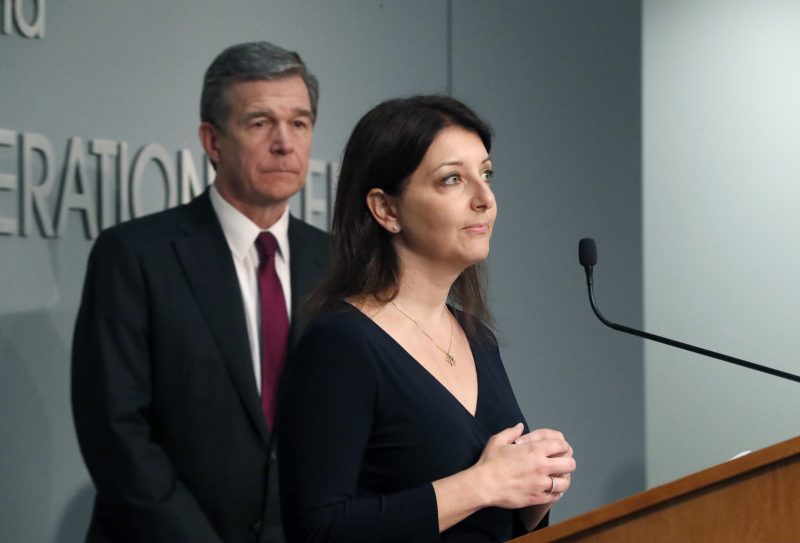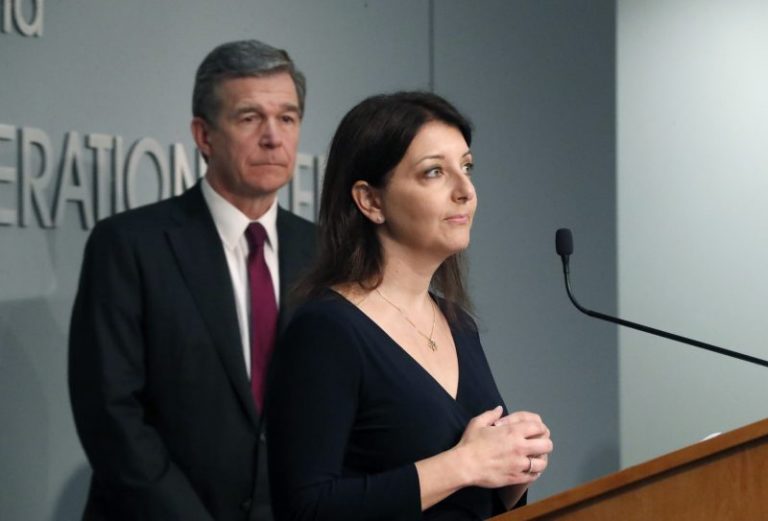
The Biden administration announced Friday that Mandy Cohen, a physician and former North Carolina health secretary, will be the next director of the Centers for Disease Control and Prevention, assuming leadership of an agency left battered by the coronavirus pandemic.
“Dr. Cohen is one of the nation’s top physicians and health leaders with experience leading large and complex organizations, and a proven track-record protecting Americans’ health and safety,” President Biden said in a statement. He said Cohen has been recognized by leaders from both parties for her ability “to find common ground and put complex policy into action.”
Cohen’s first day at CDC will be in early July, officials said. The Washington Post reported earlier this month that Biden planned to select Cohen, with White House officials citing her leadership experience in federal and state government, oversight of North Carolina’s coronavirus response, and track record of working with Republicans and the private sector.
Cohen declined to comment on the announcement. She will replace outgoing CDC Director Rochelle Walensky, who is stepping down June 30. The role does not require Senate confirmation, although that will change in January 2025.
Walensky issued a statement congratulating Cohen, calling her “a respected public health leader who helped North Carolina successfully navigate the COVID-19 pandemic” and someone who has dedicated her career to improving health outcomes for all Americans.
“Her unique experience and accomplished tenure in North Carolina — along with her other career contributions — make her perfectly suited to lead CDC as it moves forward by building on the lessons learned from COVID-19 to create an organization poised to meet public health challenges of the future,” Walensky said.
Health officials have acknowledged that CDC suffered a loss of some public trust — and blows to staff morale — amid the pandemic. Walensky last year established a center for forecasting and outbreak analytics to provide better, faster information about future outbreaks, and she announced an organizational overhaul that aims to make the 13,000-person agency more nimble and accountable.
Lawmakers have scrutinized the agency’s operations, with Congress holding two hearings this month that reviewed CDC’s decisions during the pandemic.
“We need some data authorities so that we can act nimbly, and so that we can actually, intentionally put resources where they’re needed,” Walensky testified Tuesday to a House panel scrutinizing the nation’s coronavirus response. She also called for more flexibility to hire and deploy staff, especially during emergencies.
Walensky “identified these systematic barriers that still need to be addressed” at CDC, said Rep. Raul Ruiz (D-Calif.), the top Democrat on the panel. “We need information and diagnostics quickly, in real-time, during a deadly, fast-moving virus in order to make decisions at the local level to keep people safe.”
Republican lawmakers and some public health experts have criticized CDC officials for relying on remote work in 2022 and into 2023, saying the scattered workforce complicated efforts to transform the agency — which has headquarters in Atlanta — following the pandemic. Walensky often worked from her Boston-area home during her two-year-plus tenure.
“We need a culture change at the CDC, and that is not going to happen over Zoom,” said Sen. Bill Cassidy (La.), the top Republican on the Senate health panel, who has repeatedly pressed Walensky on the agency’s policies toward remote work. “As a physician who worked in public health, in-person collaboration is essential to quickly respond to a threat and save lives.”
Cohen has told colleagues she plans to relocate to Atlanta, although she hopes to regularly visit Washington to elevate the agency’s presence on Capitol Hill and strengthen its ties across the administration.
One CDC official, who spoke on the condition of anonymity because he was not authorized to speak to the news media, said he and colleagues are “cautiously curious” about the new director, and “hopeful she will be as good” as news stories have suggested. But morale is low. “We’ve been so battered since 2020. People are just tired. And weary.”
Cohen led North Carolina’s health department for nearly five years, overseeing the state’s pandemic response in 2020 and 2021 and rolling out changes to the Medicaid program. Cohen also worked in the Obama administration, where as a senior official at the Centers for Medicare and Medicaid Services, she helped oversee federal health insurance programs that provided health coverage to more than 140 million people.
As a young physician, she worked with Vivek H. Murthy, now the surgeon general, to co-found Doctors for Obama, a group that campaigned for Barack Obama in 2008 and was later rebranded Doctors for America, to advocate for the Affordable Care Act, Obama’s signature health law. Cohen most recently has been a senior executive at Aledade, which works with independent primary care practices and health centers on improving care delivery.
Some CDC staff and alumni bristled this month at reports of Cohen’s planned selection, lamenting that her career had been more focused on managing health-care programs such as Medicare and Medicaid than on traditional public health, including fighting outbreaks and infectious diseases. But public health experts said Cohen had sufficient expertise to lead the agency.
“Cohen’s public health experience spans covid response to chronic disease prevention,” said Dave A. Chokshi, a physician and a former New York City health commissioner. “I am excited to see how she bridges public health and health care delivery at the CDC, since she has significant expertise in both.”
John Auerbach, a former Massachusetts public health commissioner who served as CDC director of intergovernmental and strategic affairs, said Cohen’s role in North Carolina “was a really complicated administrative job that is not unlike the administrative challenge of running a complicated federal agency. Nonetheless, she undoubtedly will want to spend her first few months getting to know the agency and its employees, a process that takes some time.”
Auerbach remembers Cohen relating a story about her experience as a physician caring for a patient. The patient kept returning to see Cohen, who couldn’t figure out what the problem was “because all the tests were negative” for various medical conditions.
Then, Cohen discovered the patient was living in a car and not eating regularly, a situation that had nothing to do with medical conditions. That experience touched her and contributed to Cohen’s understanding of the importance of paying attention to the social and economic factors that contribute to health, Auerbach said.


Comments are closed.